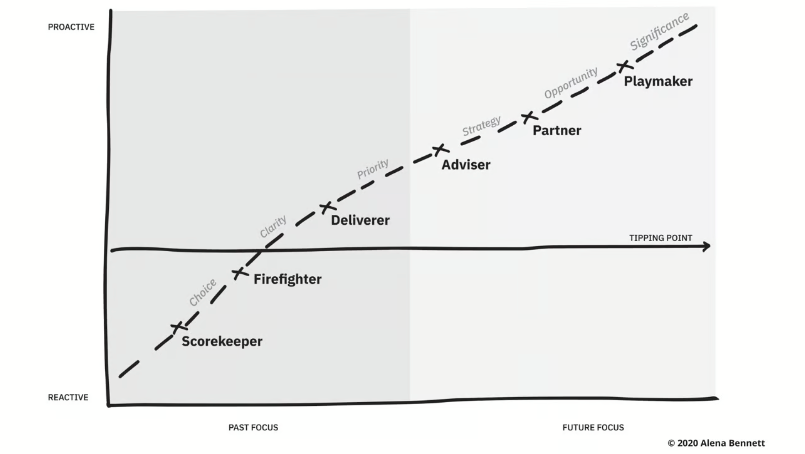My daughters have just started playing soccer and I was speaking with a fellow mum on the weekend about how they choose 'player of the week'. She observed that it might be easy to overlook some players because they're not 'showy', don't score or save goals, but yet heavily contribute in running the ball up the middle of the field.
Later that day I watched the Geelong Cats smash the Essendon Bombers and whilst Tom Hawkins got player of the match kicking 8 goals, it was Patrick Dangerfield's contribution that caught my eye. 28 disposals, 15 inside 50s, 10 clearances, 14 contested possessions, 14 uncontested possessions and 3 goal assists.
What this tells you (even if you don't follow AFL) is that while Hawkins scored lots of points directly contributing to the impressive scoreline, 'Danger' was incredibly impactful in making plays happen up and down the field. Hawkins ended up with a trophy, Danger did not.
CFOs often feel like the unsung hero
One of the upsides of the COVID-19 pandemic for CFOs was that it gave them an opportunity to get that elusive "seat at the table". It required them to have a voice and their CEOs, Boards their executive C-suite peers alike pulled them close to help them through the challenging period.
However, while the importance of the CFO role has not diminished and given the increasingly challenging economic climate organisations and consumers find themselves in, many CFOs have not been able to take advantage of their seat at the table.
Visibility is not the same as opportunity
If a tree falls in the woods and no one hears it, did it happen?
It's a little like if a CFO isn't heard or seen at the table, are they even there?
So whilst now I find most CFOs are at the table, many are not visible with the positioning they desire.
What does that mean? you may ask.
Let's take the classic end of financial year period as an example. Most CFOs need to take their CEO, Executive Team and Audit Committee through a variety of financial or audit matters for discussion and/or approval. It is not uncommon for this to spark reasonable debates which, in turn, result reflect on a CFOs positioning.
If you want your positioning to be a Commercially focused partner to your business, do you want your positioning to be influenced by your responsibility to communicate historical performance results adjusted for accounting standards? Of course you don't!
Measuring metrics that matter
Using the AFL analogy above, if I'm measuring player of the match based on points scored, then that's easy – I look at the number of goals and behinds kicked and I'm awarding that to Hawkins. If I'm measuring based on overall contribution to the scoreline, then I need to look at other metrics – like Inside 50s, number of disposals, etc.
The AFL has 2 different medals at the end of the season that address each of these: The Coleman Medal kicks the most goals and The Brownlow Medal for the best and fairest player in the comp over the season.
Which is better? Which are players striving for?
Choosing your positioning
One of the first things we do with our CFOs is create their 5 year plan. Through this process, we help them identify their unique value proposition, or their 'edge'. We help them answer the question 'what is the contribution to the world you want to make through your career?'
We help them determine their future positioning.
That way, we can help them create strategies and frameworks to achieve said positioning.
A perception happens by accident. Positioning is intentional.
Why do some CFOs have a positioning problem?
The answer is simple – positioning isn't their priority. They've bought into the belief that their performance will speak for itself. That belief is how perceptions are created and it's outdated.
Don't get me wrong – there's a day job so positioning can't be the only thing. But when positioning is an afterthought to the myriad of challenges including (but not limited to):
• Tension between above/below the line activities
• Lack of resources
• Lack of capable talent
• Unsupportive relationship with CEO
• Dealing with difficult stakeholders who have their own agendas, egos and priorities that aren't aligned,
then it comes as no surprise that CFOs are stretched too thin to do the thinking and planning required to make positioning part of their everyday and not a project.
Step 1: Pick your positioning
Would you rather be seen as a business partner or policeman?
Have you got bored of being a business partner and are you ready to become a playmaker?
Are you just trying to take the first step and get that seat at the table?
No matter where you are, the first step you need to take is identify the positioning you want to have. You need to know what that positioning looks like in action, what outcomes that positioning will deliver to you and your organisation and the mindset and habits of a CFO with that positioning.
Step 2: Learn your current positioning
Looking in the mirror isn't everyone's favourite thing to do and unlike sports players, we don't always have stats regularly updated and at hand. However, here are a few things you likely do have access to:
• Your most recent 360 review. Remind yourself what people said about you and objectively assess what that means for your positioning.
• Your boss: ask them how they would describe you in your next 1:1.
• Your team/stakeholders: as for your boss, choose 1 or 2 of your most trusted team members or stakeholders how they would describe you. Make it balanced!
If you need additional tools, please reach out here.
Step 3: Identify your strategy to close any gap in your positioning
Your strategy needs to be stretch, but it needs to be real. CFOs have a lot on their plates at the moment, and there's no point in creating a plan to elevate your positioning if your plan ignores the realities and responsibilities of your day job.
Your strategy should include:
• Your stakeholders: who is involved that needs to contribute to or participate in you closing this gap? Who will you include in your Powerbase?
• Your skills: what skills will you need to employ and/or learn to improve your positioning?
• The steps: What steps will you need to take and by when?
• The measures: How will you know you're on track?
Shift the language, shift the positioning
One of the biggest challenges that many CFOs share with me about their positioning, is their constant getting dragged back into the detail due to lack of resources. When a CFO is in the detail and not supported by a high performing business partnering team, naturally it negatively impacts the CFOs positioning.
But that context isn't going to change overnight.
That is why one of the fastest ways I think CFOs should shift their positioning is through changing the terminology.
The Office of the CFO
I've just released the 2023 CFO Annual Report which provides another perspective to the positioning problem some CFOs experience and discusses why we need start using the term 'The Office of the CFO'.
Particularly for CFOs with small finance teams, the gap between the CFO and the finance staff is big (and in many cases has grown in the past 2 years). But just because you have a small team shouldn't diminish the impact of the work you do and therefore your positioning.
When the Office of the CEO emails you – do you say, 'oh, there's only 1 CEO, it doesn't matter' or do you prioritise it? I think the same attitude should be taken when it comes to the CFO. Click here if you'd like to read more.
Your positioning is critical if you need stakeholder buy-in.
If I were an AFL player, I don't know what I'd go for – the coveted Brownlow or the Coleman Medal? But I'd sure like to choose and have the option.



